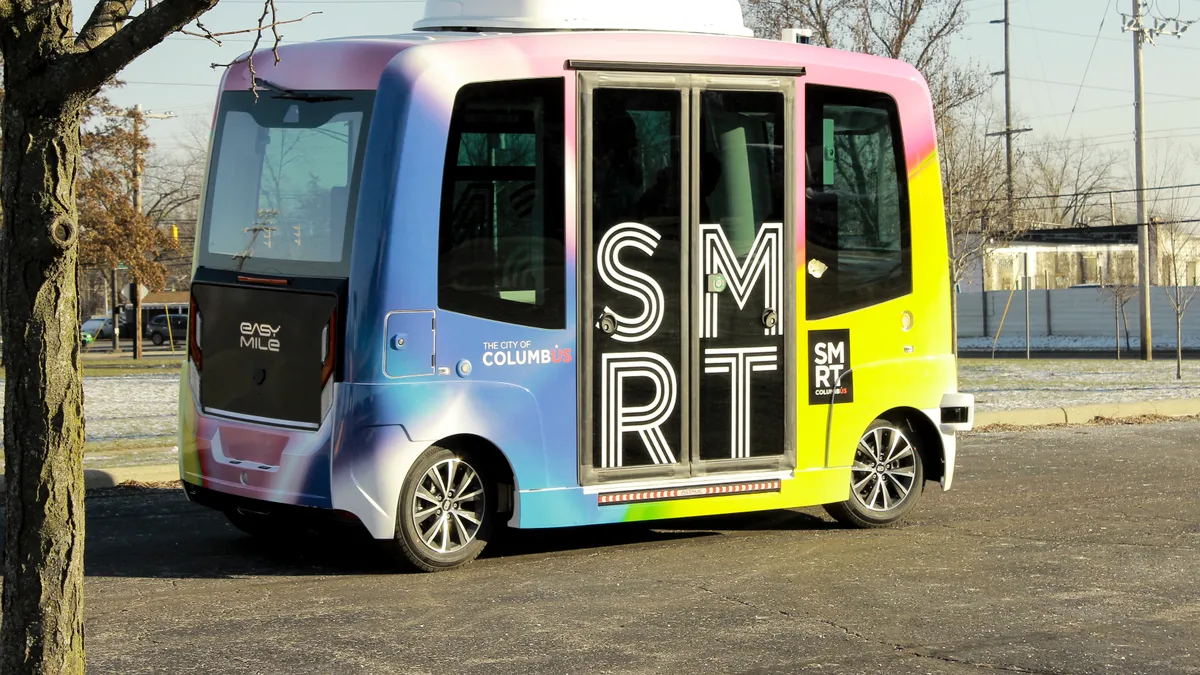Dive Brief:
- The City of Columbus, OH unveiled three mobility tech pilot programs in its Linden neighborhood earlier this week as part of its Smart Columbus initiative.
- Leaders opened six Smart Mobility Hubs close to the city's only bus rapid transit (BRT) line, featuring IKE interactive kiosks and a combination of shared bikes, e-bikes, scooter parking and charging; electric vehicle (EV) charging; ride-hailing pick-up and drop-off points; and car-share parking. And Smart Columbus announced it is seeking 500 community volunteers to test the safety impacts of connected vehicle technology, as Linden is home to a number of intersections that experience a high volume of automobile crashes.
- The city also recommissioned the Linden LEAP autonomous shuttles to transport pre-packaged food. Local officials said the move comes amid an "unprecedented need for food" during the coronavirus pandemic (COVID-19). All three pilots will run through March 2021.
Dive Insight:
Funded by a $40 million grant awarded to the city following the 2016 Smart City Challenge, the three mobility projects are "all very interconnected and interwoven" across the Linden community, Smart Columbus Program Manager Mandy Bishop told Smart Cities Dive. Two of the Smart Mobility Hubs are located along the autonomous shuttle's original route, while the connected vehicle corridor is along Cleveland Avenue, which connects to the BRT line and the Linden Transit Center.
Bishop said the Smart Mobility Hubs are a "physical manifestation of intermodal connectivity," something Smart Columbus has already experimented with digitally through its multimodal trip-planning app.
And the connected vehicle study, which comes after months of neighborhood liaisons sharing information on the technology with the public, will see those 500 private vehicle volunteers matched with vehicles from city and Franklin County governments, local first responders, freight trucks and supervisor vehicles from the Central Ohio Transit Authority (COTA). Volunteer recruitment will come initially in the form of a public survey to gauge initial interest, while videos will showcase what the technology can do, Bishop said.
This approach to building engagement around an initiative represents a new phase of experimentation, said Alyssa Chenault, communications project manager at Smart Columbus. "There's kind of a trickle campaign up to this point of, OK, now we're ready for you to take action. We're hoping laying that groundwork will pay off," Chenault told Smart Cities Dive.
The relaunch of the autonomous shuttle comes as other cities have experimented with using autonomous vehicles (AV) to transport goods instead of just people. The Jacksonville Transportation Authority (JTA), for instance, partnered with Beep and NAVYA to transport COVID-19 tests from a drive-thru testing site to a processing laboratory.
"I think residents are really encouraged when they hear that to think about the practical uses of how this technology can help their neighbors better navigate the community," Smart Columbus Director Jordan Davis told Smart Cities Dive in an interview last year.
Bishop said it will be key to see how the pilots are solving real-life problems for residents, instead of just demonstrating "technology for tech's sake." Community feedback will be key, she said.
"It's really going to be listening to the resident impact, evaluating that and then learning how to apply it more city- and region-wide," Bishop said.












